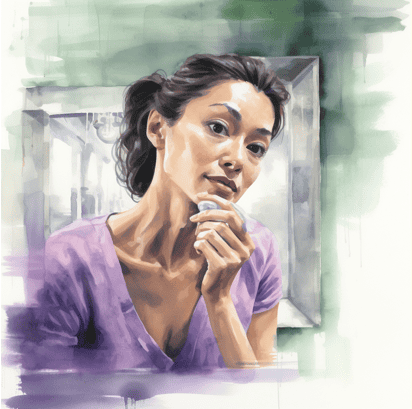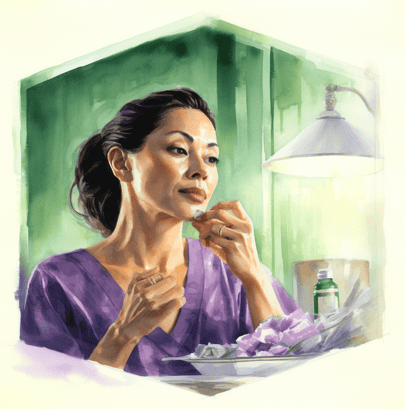
Does menopause cause acne? Just when you thought you’d left those pesky pimples behind in your teenage years, menopause comes knocking with a whole new set of skin surprises. Reduce menopausal acne with targeted dietary and skincare strategies that enhance your skin health and also ease menopause symptoms.
Hi, I’m Hazel
I gave up on skincare after years of issues with acne and sensitive skin.
But after going plant-based, my skin cleared up and even started to glow. Now I help women reveal their natural beauty with simple, delicious plant-based food.
I also used to be a nurse, and love nerding out on nutritional science (high-quality science, that is).

As usual, this post is based on the strongest nutritional evidence I could find with a focus on the simplest, most delicious foods
…because who has time to waste on actions that don’t work?
Does menopause cause Acne? The quick version…
Yes, menopause can lead to acne as hormonal balances shift. Fortunately, incorporating simple, plant-based foods and drinks into your diet can help mitigate both your acne and other menopausal symptoms.
What is Menopausal Acne?

Menopausal acne is different from other forms of acne primarily due to its causes and the skin conditions of the individuals it affects. Some key differences include:
- Skin Characteristics: The skin of menopausal women is generally thinner, drier, and less elastic due to decreased collagen production and other age-related changes. This can affect how the skin reacts to acne and its treatment. For instance, skincare products that are suitable for oily, thicker teenage skin may be too harsh for menopausal skin, which requires more moisturising and gentler care.
- Type of Acne: The acne that appears during menopause typically manifests as inflammatory acne with deep, painful cysts, rather than the blackheads and whiteheads more commonly seen in teenage acne. These can be more challenging to treat and may leave scars if not managed properly.
- Location: Menopausal acne often appears along the lower part of the face, particularly around the jawline and chin. This differs from the typical T-zone distribution (forehead, nose, and chin) commonly seen in adolescent acne.
- Underlying Skin Conditions: Menopausal women are more likely to have concurrent skin conditions such as rosacea or sensitivity, which can complicate acne treatment. Products and treatments must be chosen with care to avoid exacerbating these conditions.
Why am I Getting Menopausal Acne?
Hormonal Imbalances
During menopause, your body’s hormonal changes lead to a decrease in estrogen levels and an increase in androgen levels. This shift can boost oil production, affecting your sebaceous glands and potentially leading to adult acne or cystic acne (1, 2).
Hormone Replacement Therapy (HRT) can be a double-edged sword for your skin during menopause. While it may help balance hormone levels by supplementing less estrogen, it also affects your skin’s health. The added hormones can sometimes stimulate your oil glands, leading to increased sebum production—a key player in acne development.
Stress hormones, like cortisol, also play a significant role. Increased stress can heighten cortisol levels, which further stimulate the oil glands and can exacerbate acne issues by promoting acne-causing bacteria growth. Managing stress is as crucial as managing hormones for maintaining healthy skin.
The Impact
Recognising these hormonal adjustments is crucial. By identifying the root causes of these skin changes, you can take targeted actions to manage and mitigate acne during menopause.
You might also like:
The Miracle of Tea: Best Teas for Hormonal Balance
Dietary Approaches to Menopausal Acne

While there are numerous topical and medical treatments available, your diet plays a potentially more powerful role in managing both acne and menopausal symptoms.
Embracing a diet rich in specific nutrients can help mitigate these conditions effectively.
How Antioxidants Help Menopausal Acne

Oxidative Stress and Menopause: Oxidative stress results from an imbalance between free radicals and antioxidants in the body. This imbalance is associated with menopausal symptoms, including hot flashes (3).
Antioxidants and Skin Health: Antioxidants help neutralise free radicals, which can reduce inflammation and the severity of acne. By mitigating oxidative stress, antioxidants support healthier skin function and appearance during menopause.
Dietary Impact: Incorporating antioxidant-rich foods into your diet can help manage acne by improving your skin’s resilience and reducing inflammation, key contributors to acne during menopause (4).
Also Add Soy (for extra menopausal benefits)
Soy and Menopausal Relief: Regular consumption of soy products, such as soy milk, tofu, and edamame, can significantly alleviate menopause symptoms. Research indicates that about two servings of soy foods daily may lessen the frequency and severity of hot flashes, providing a natural alternative to estrogen hormone therapy.

Hormonal Impact of Soy: Soy contains isoflavones, which are plant-based compounds that mimic estrogen in the body. This can be particularly beneficial during menopause, as it helps balance estrogen levels naturally. For women experiencing menopausal acne, this balance can reduce the hormonal fluctuations that contribute to acne outbreaks.
Substituting Soy Milk for Cow’s Milk: Replacing cow’s milk with soy milk could have a positive impact on your hormonal health. Cow’s milk is associated with increased levels of certain hormones that can exacerbate acne. Soy milk, with its estrogen-like effects, may offer a more skin-friendly alternative, supporting a smoother hormonal transition during menopause.
Even if you’re not worried about does menopause cause acne, by integrating soy into your diet, you not only address broader menopausal symptoms but also create a favourable environment for managing hormonal acne.
You might also like:
Herbs for Hormonal Acne: Transform Your Skin
Non-Dietary Treatments for Acne Breakouts
Topical Treatments for Menopausal Acne

Choosing Effective Skincare Products: For menopausal women looking to manage acne, consider incorporating topical retinoids, alpha hydroxy acids, and azelaic acid. These active ingredients can reduce severe acne breakouts by promoting skin cell turnover and fighting bacteria. Chemical peels can also rejuvenate menopausal skin by removing dead skin cells.
Integrating Over-the-Counter Treatments: Including benzoyl peroxide and salicylic acid in your skincare routine can provide additional benefits. Benzoyl peroxide is effective at killing acne-causing bacteria, while salicylic acid helps clear clogged pores, crucial for preventing new acne lesions.
Navigating Potential Risks: Be cautious of the side effects associated with these potent skincare products. They can cause skin irritation, stinging, and dry skin, especially in menopausal women whose skin may be more sensitive. Starting with lower concentrations and gradually increasing as tolerated can help minimize these risks.
Medications and Their Side Effects
When Topical Treatments Are Not Enough: For severe cases of acne that do not respond well to topical treatments, oral antibiotics and prescription options can be considered. These systemic treatments can be effective but come with potential side effects, including gastrointestinal issues and the risk of antibiotic resistance.
By carefully selecting and using these treatments, menopausal women can effectively manage their acne while minimising potential adverse effects.
Does menopause cause acne?
As we’ve explored, does menopause cause acne? Yes, it often does due to hormonal changes typical of this life stage. Menopausal acne can be more challenging due to the mature nature of the skin and its specific needs. Understanding these distinctions helps in selecting the right treatments and dietary adjustments to manage symptoms effectively.
References
Most references below will link to the original peer-reviewed study itself. However, sometimes I will link to a video over at NutritionFacts.org instead, which is by far the single best resource of brutally transparent nutritional evidence you will ever see. Dr Greger tells a great story about the realities of the science and if I think you will benefit more from one of his videos, the link will take you there instead.
Happy nerding!
- Rao A, Douglas SC, Hall JM. Endocrine Disrupting Chemicals, Hormone Receptors, and Acne Vulgaris: A Connecting Hypothesis. Cells. 2021;10(6):1439. Published 2021 Jun 9. doi:10.3390/cells10061439
- Khunger N, Mehrotra K. Menopausal Acne – Challenges And Solutions. Int J Womens Health. 2019;11:555-567. Published 2019 Oct 29. doi:10.2147/IJWH.S174292
- Cagnacci A, Cannoletta M, Palma F, Bellafronte M, Romani C, Palmieri B. Relation between oxidative stress and climacteric symptoms in early postmenopausal women. Climacteric. 2015;18(4):631-636. doi:10.3109/13697137.2014.999659
- Abshirini M, Siassi F, Koohdani F, et al. Dietary total antioxidant capacity is inversely related to menopausal symptoms: a cross-sectional study among Iranian postmenopausal women. Nutrition. 2018;55-56:161-167. doi:10.1016/j.nut.2018.04.014
- Taku K, Melby MK, Kronenberg F, Kurzer MS, Messina M. Extracted or synthesized soybean isoflavones reduce menopausal hot flash frequency and severity: systematic review and meta-analysis of randomized controlled trials. Menopause. 2012;19(7):776-790. doi:10.1097/gme.0b013e3182410159